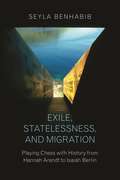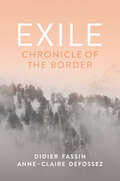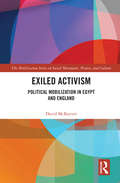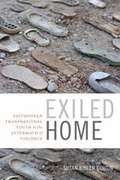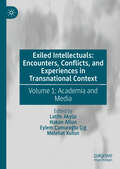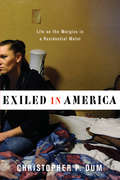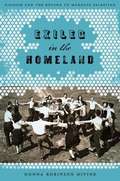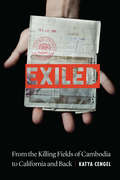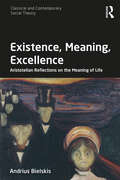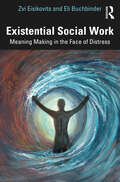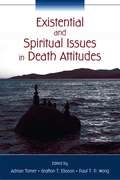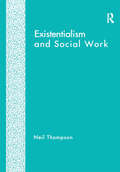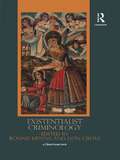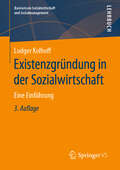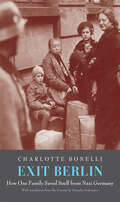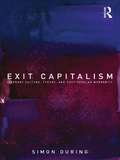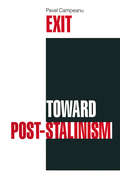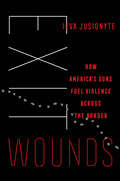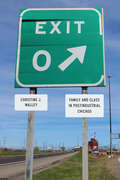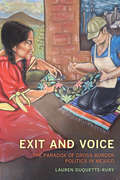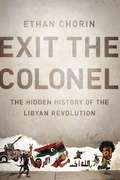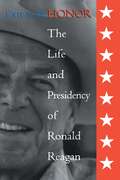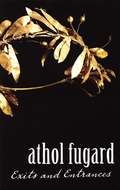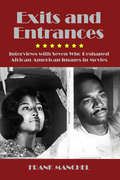- Table View
- List View
Exile, Statelessness, and Migration: Playing Chess with History from Hannah Arendt to Isaiah Berlin
by Seyla BenhabibAn examination of the intertwined lives and writings of a group of prominent twentieth-century Jewish thinkers who experienced exile and migrationExile, Statelessness, and Migration explores the intertwined lives, careers, and writings of a group of prominent Jewish intellectuals during the mid-twentieth century—in particular, Theodor Adorno, Hannah Arendt, Walter Benjamin, Isaiah Berlin, Albert Hirschman, and Judith Shklar, as well as Hans Kelsen, Emmanuel Levinas, Gershom Scholem, and Leo Strauss. Informed by their Jewish identity and experiences of being outsiders, these thinkers produced one of the most brilliant and effervescent intellectual movements of modernity.Political philosopher Seyla Benhabib’s starting point is that these thinkers faced migration, statelessness, and exile because of their Jewish origins, even if they did not take positions on specifically Jewish issues personally. The sense of belonging and not belonging, of being “eternally half-other,” led them to confront essential questions: What does it mean for the individual to be an equal citizen and to wish to retain one’s ethnic, cultural, and religious differences, or perhaps even to rid oneself of these differences altogether in modernity? Benhabib isolates four themes in their works: dilemmas of belonging and difference; exile, political voice, and loyalty; legality and legitimacy; and pluralism and the problem of judgment.Surveying the work of influential intellectuals, Exile, Statelessness, and Migration recovers the valuable plurality of their Jewish voices and develops their universal insights in the face of the crises of this new century.
Exile: Chronicle of the Border
by Didier Fassin Anne-Claire DefossezIn recent decades, the forced displacement of populations has fueled nationalism and xenophobia across the world, arousing fear and hostility. Policies have been implemented to deter migrants, crack down on humanitarian workers and externalize border monitoring in remote territories. Men, women and children who flee political violence, religious persecution or poverty in their country and set off on journeys often lasting years may find themselves on dangerous routes where they face police brutality, gang rackets, confinement camps, barbed-wire fences, the rigors of the desert and the perils of the sea. Many lose their lives. But what do we really know about the experience of these people, the hazards they encounter, repression they endure, and the assistance they receive? This is what Didier Fassin and Anne-Claire Defossez set out to uncover through the research they conducted at the border between Italy and France, in a region of the Alps that has become, since the mid-2010s, a privileged site of passage for people arriving in Europe from Afghanistan, Iran, the Maghreb and sub-Saharan Africa. Over a period of five years, they collected their poignant stories, participated in the activities of a shelter, took part in mountain rescue operations, interviewed politicians, policy makers and law enforcement officers. Their investigation reveals the ineffectiveness of the militarization of the border and the dismay of the police who are aware of the futility of their mission; it attests to the solidarity and commitment of the volunteers; and it explores the form of life of exiles, which has become a defining feature of our time. This timely and well-researched book will be of great value to students and scholars in sociology, anthropology, politics and geography, and to anyone interested in migration and refugees today.
Exiled Activism: Political Mobilization in Egypt and England (The Mobilization Series on Social Movements, Protest, and Culture)
by David McKeeverThis book examines the relationship between exile and activism. Drawing on interviews with activists exiled to England following the military coup d’état in Egypt as an illustrative case, it considers whether exile presents any barrier to meaningful political participation. Through a comparison of activism in Egypt with exiled activism in England, the author explores the mechanisms mediating the changes in the activists’ activities, tracing the conditions for exile in institutions of dictatorship and shedding light on the process by which activism is decertified and fear of repression becomes internalised within a movement - a process that is counteracted in the sanctuary and stability of a host country in which activist networks are founded and the exile repertoire is expanded. A significant contribution to social movement theory, this book will appeal to sociologists and political scientists with interests in political mobilisation and contentious politics.
Exiled Home: Salvadoran Transnational Youth in the Aftermath of Violence
by Susan Bibler CoutinIn Exiled Home, Susan Bibler Coutin recounts the experiences of Salvadoran children who migrated with their families to the United States during the 1980-1992 civil war. Because of their youth and the violence they left behind, as well as their uncertain legal status in the United States, many grew up with distant memories of El Salvador and a profound sense of disjuncture in their adopted homeland. Through interviews in both countries, Coutin examines how they sought to understand and overcome the trauma of war and displacement through such strategies as recording community histories, advocating for undocumented immigrants, forging new relationships with the Salvadoran state, and, for those deported from the United States, reconstructing their lives in El Salvador. In focusing on the case of Salvadoran youth, Coutin's nuanced analysis shows how the violence associated with migration can be countered through practices that recuperate historical memory while also reclaiming national membership.
Exiled Intellectuals: Volume 1: Academia and Media
by Latife Akyüz Melehat Kutun Hakan Altun Eylem Çamuroğlu ÇığRight after the Gezi Resistance, a new tendency of authoritarianism rapidly emerged in Turkey and AKP government started targeting anyone it perceives as a threat to its rule, especially academics, journalists, politicians, actors, directors, i.e. the intellectuals who produce oppositional art and critical knowledge, criminalizing them as enemies of the state. The authoritarian regime has permeated every aspect of economic, social, cultural, and political life, institutionalized primarily through the ongoing state of emergency declared in the wake of the July 15, 2016 coup attempt (one might also consider this as a controlled and manipulated toxoid coup). This new climate has started to limit the opportunities of production and reproduction for the intellectuals and artists, and even holding a dissident stance became a source of risk on its own. The Republic of Turkey limited, oppressed and punished the means of expression by giving one of the harshest (and maybe the most violent) reactions of its history against critical thought and opposition. The culture of democracy, which was almost already non-existent, has been completely abolished through the suspension of democracy on the ostensible level. This ongoing period is one, in which producers of critical knowledge and opposing artists are being faced with immense oppression and penal sanctions. One of the outcomes of this process is a kind of new-nomadism that we can sketch out as “leaving behind”. And one of the forms of this leaving is (voluntary or involuntary) exile. The majority of those whom we call “new-exile intellectuals” today have relocated generally to Western Europe, Great Britain, the United States, and especially to Germany. This new wave of political forced migration, which started in the aftermath of the Gezi uprisings and gained momentum following the coup attempt, has been defined by the editors of the book as “new-exile”', in order to draw a framework, as it has some unique characteristics different from the previous waves. The fundamental property of this experience is the simultaneous mobilization of intellectual capital and (bi-polar) opposition. This oppositional stance is both against the dominant global order and against German-style authoritarianism as well as Turkish-style fascism. It is bi-polar in the context of exile. The form of the opposition in question has the ability to take root in the lands it arrives at. It does not point towards a single direction (forward or backward) and a single place (the place it was ruptured); it is here/now and multidirectional. This state of new-exile bears the efforts of existing critical knowledge and art producers in the “heim” to which they have relocated, as critical knowledge and art producers are opposed to the dominant world system as well as to fascism in Turkey. As political subjects of the resistance against authoritarianism, they are continuously and collectively fighting against the structural fate of displacement. As both subjects and researchers of this current state of new-exile, it is our primary responsibility to understand and produce knowledge of these intellectuals’ responses in this new life, to monitor the creation processes of the new mechanisms to cope with the challenges, and to understand/investigate the effects of all these on the transnational social space. We have tried to determine the content of this book based on our own experiences as new-exiled intellectuals. We believe that in this period of new-exile we are subjects and witnesses of a historic period due to our individual struggle for existence as well as our modes of organization and solidarity as a group of new-exiled intellectuals. On one hand, we know that while transforming ourselves, we pave the way for mutual interaction and the transformation of the structures in which we relate. This is precisely why the motivation behind the idea of compiling this book, lies not only in academic concerns such as analyzing t
Exiled Intellectuals: Volume 2: Politicians and Artists
by Latife Akyüz Melehat Kutun Hakan Altun Eylem Çamuroğlu ÇığRight after the Gezi Resistance, a new tendency of authoritarianism rapidly emerged in Turkey and AKP government started targeting anyone it perceives as a threat to its rule, especially academics, journalists, politicians, actors, directors, i.e. the intellectuals who produce oppositional art and critical knowledge, criminalizing them as enemies of the state. The authoritarian regime has permeated every aspect of economic, social, cultural, and political life, institutionalized primarily through the ongoing state of emergency declared in the wake of the July 15, 2016 coup attempt (one might also consider this as a controlled and manipulated toxoid coup). This new climate has started to limit the opportunities of production and reproduction for the intellectuals and artists, and even holding a dissident stance became a source of risk on its own. The Republic of Turkey limited, oppressed and punished the means of expression by giving one of the harshest (and maybe the most violent) reactions of its history against critical thought and opposition. The culture of democracy, which was almost already non-existent, has been completely abolished through the suspension of democracy on the ostensible level. This ongoing period is one, in which producers of critical knowledge and opposing artists are being faced with immense oppression and penal sanctions. One of the outcomes of this process is a kind of new-nomadism that we can sketch out as “leaving behind”. And one of the forms of this leaving is (voluntary or involuntary) exile. The majority of those whom we call “new-exile intellectuals” today have relocated generally to Western Europe, Great Britain, the United States, and especially to Germany. This new wave of political forced migration, which started in the aftermath of the Gezi uprisings and gained momentum following the coup attempt, has been defined by the editors of the book as “new-exile”', in order to draw a framework, as it has some unique characteristics different from the previous waves. The fundamental property of this experience is the simultaneous mobilization of intellectual capital and (bi-polar) opposition. This oppositional stance is both against the dominant global order and against German-style authoritarianism as well as Turkish-style fascism. It is bi-polar in the context of exile. The form of the opposition in question has the ability to take root in the lands it arrives at. It does not point towards a single direction (forward or backward) and a single place (the place it was ruptured); it is here/now and multidirectional. This state of new-exile bears the efforts of existing critical knowledge and art producers in the “heim” to which they have relocated, as critical knowledge and art producers are opposed to the dominant world system as well as to fascism in Turkey. As political subjects of the resistance against authoritarianism, they are continuously and collectively fighting against the structural fate of displacement. As both subjects and researchers of this current state of new-exile, it is our primary responsibility to understand and produce knowledge of these intellectuals’ responses in this new life, to monitor the creation processes of the new mechanisms to cope with the challenges, and to understand/investigate the effects of all these on the transnational social space. We have tried to determine the content of this book based on our own experiences as new-exiled intellectuals. We believe that in this period of new-exile we are subjects and witnesses of a historic period due to our individual struggle for existence as well as our modes of organization and solidarity as a group of new-exiled intellectuals. On one hand, we know that while transforming ourselves, we pave the way for mutual interaction and the transformation of the structures in which we relate. This is precisely why the motivation behind the idea of compiling this book, lies not only in academic concerns such as analyzing t
Exiled in America: Life on the Margins in a Residential Motel (Studies in Transgression)
by Christopher DumResidential motels have long been places of last resort for many vulnerable Americans—released prisoners, people with disabilities or mental illness, struggling addicts, the recently homeless, and the working poor. Cast aside by their families and mainstream society, they survive in squalid, unsafe, and demeaning circumstances that few of us can imagine. For a year, the sociologist Christopher P. Dum lived in the Boardwalk Motel to better understand its residents and the varied paths that brought them there. He witnessed moments of violence and conflict, as well as those of care and compassion. As told through the voices and experiences of motel residents, Exiled in America paints a portrait of a vibrant community whose members forged identities in response to overwhelming stigma and created meaningful lives despite crushing economic instability. In addition to chronicling daily life at the Boardwalk, Dum follows local neighborhood efforts to shut the establishment down, leading to a wider analysis of legislative attempts to sanitize shared social space. He also suggests meaningful policy changes to address the societal failures that lead to the need for motels such as the Boardwalk. The story of the Boardwalk, and the many motels like it, will concern anyone who cares about the lives of America's most vulnerable citizens.
Exiled in the Homeland
by Donna Robinson DivineOffering a new perspective on Zionism, Exiled in the Homeland draws on memoirs, newspaper accounts, and archival material to examine closely the lives of the men and women who immigrated to Palestine in the early twentieth century. Rather than reducing these historic settlements to a single, unified theme, Donna Robinson Divine's research reveals an extraordinary spectrum of motivations and experiences among these populations. Though British rule and the yearning for a Jewish national home contributed to a foundation of solidarity, Exiled in the Homeland presents the many ways in which the message of emigration settled into the consciousness of the settlers. Considering the benefits and costs of their Zionist commitments, Divine explores a variety of motivations and outcomes, ranging from those newly arrived immigrants who harnessed their ambition for the goal of radical transformation to those who simply dreamed of living a better life. Also capturing the day-to-day experiences in families that faced scarce resources, as well as the British policies that shaped a variety of personal decisions on the part of the newcomers, Exiled in the Homeland provides new keys to understanding this pivotal chapter in Jewish history.
Exiled: From the Killing Fields of Cambodia to California and Back
by Katya CengelSan Tran Croucher&’s earliest memories are of fleeing ethnic attacks in her Vietnamese village, only to be later tortured in Cambodia by the Khmer Rouge. Katya Cengel met San when San was seventy-five years old and living in California, having miraculously survived the Cambodian genocide with her three daughters, Sithy, Sithea, and Jennifer. But San&’s family&’s troubles didn&’t end after their resettlement in California. As a teenager under the Khmer Rouge, San&’s daughter Sithy had been the family&’s savior, the strong one who learned how to steal food to keep them alive. In the United States, Sithy&’s survival skills were best suited for a life of crime, and she was eventually jailed for drug possession. U.S. immigration law enforces deportation of any immigrant or refugee who is found guilty of certain illegal activities, and San has hired a lawyer to fight Sithy&’s deportation case. Only time will tell if they are successful. In Exiled Cengel follows the stories of four Cambodian families, including San&’s, as they confront criminal deportation forty years after their resettlement in the United States. Weaving together these stories into a single narrative, Cengel finds that violence comes in many forms and that trauma is passed down through generations. With no easy answers, Cengel reveals a cycle of violence, followed by safety, and then loss.
Existence, Meaning, Excellence: Aristotelian Reflections on the Meaning of Life (Classical and Contemporary Social Theory)
by Andrius BielskisThis book addresses the ‘perennial’ question of the meaning of life from the point of view of a novel interpretation of Aristotle’s teleology. Beginning with the premise that at the core of modernity and modern moral imagination are the entropy of meaning and the sense of meaninglessness, the author critically engages with the work of the post-war existentialists, chiefly that of Albert Camus and Martin Heidegger, to argue that their analyses are unconvincing and that the question of the meaning of being should therefore be approached using different assumptions, based on the notion of flourishing life. From this Aristotelian outlook, Existence, Meaning, Excellence employs Alasdair MacIntyre’s critique of modernity, together with his conceptions of practice and the narrative unity of life and tradition to provide a novel philosophical account of existence, meaning and excellence - an account which is used to contribute to debates (between Kantian and Nietzschean perspectives) on the nature of art and genius, with Mozart’s genius being used by way of illustration. A fascinating and powerfully argued engagement with existentialist thought that draws on the ‘virtue’ tradition to explore questions of meaning, as well as wider questions within philosophy, this book will appeal to philosophers and social theorists with interests in existentialism, moral philosophy and accounts of ‘the good’ based on the notions of human flourishing.
Existential Social Work: Meaning Making in the Face of Distress
by Zvi Eisikovits Eli BuchbinderThis book is a theoretical and practical guide for mental health professionals who wish to utilize existential principles in their social work and clinical practice. Existential questions concerning life situations, such as anxiety, suffering, choosing, authenticity, are at the heart of the craft of any helping profession. The book aims to confront students and practitioners with the need to be simultaneously philosophical and experiential in their clinical approach. Written in an accessible tone, Eisikovits and Buchbinder bridge existential-philosophical concepts often seen as removed from everyday practice and the practical concerns of therapy. Each chapter presents a concept from existential philosophical tradition, such as anxiety, meaning making, time, and space, and then demonstrates their use by drawing from real-life clinical examples and interventions. The book illustrates their implementation in social work practice with reference to values such as client participation, self-determination, and free will. The book is intended for courses and advanced training in existential social work and therapy. It is essential reading for training social workers, counselors, therapists, and other helping professionals interested in existentialism.
Existential and Spiritual Issues in Death Attitudes
by Adrian Tomer • Grafton T. Eliason • Paul T. P. WongExistential and Spiritual Issues in Death Attitudes provides: an in-depth examination of death attitudes, existentialism, and spirituality and their relationships; a review of the major theoretical models; clinical applications of these models to issues such as infertility, bereavement, anxiety, and suicide; and an introduction to meaning managemen
Existentialism and Social Work
by Neil ThompsonExistentialism and Social Work provides a clearly-expressed and well-argued exposition of Sartrean existentialism as a theory base for social work practice. It introduces the key concepts and themes of the philosophy and relates them to social welfare theory and practice. Existentialism is a valuable means of making sense of many of the complexities, contradictions and dilemmas which social work staff encounter. The book explores the relationship between theory and practice and examines how existentialism can help to bridge the gap. A number of theoretical perspectives are evaluated from an existentialist perspective and links are drawn between Sartre’s philosophy and aspects of commonly used theories and methods. But this is not simply a theoretical analysis. Neil Thompson also explores the use of existentialism as a guide to day-to-day practice and draws up a set of Principles for Practice . The ultimate aim is to present existentialism as a concrete philosophy of praxis.
Existentialist Criminology
by Ronnie Lippens Don CreweExistentialist Criminology captures an emerging interest in the value of existentialist thought and concepts for criminological work on crime, deviance, crime control, and criminal justice. This emerging interest chimes with recent social and cultural developments - as well as shifts in their theoretical consideration - that are oriented around contingency and unpredictability. But whilst these conditions have largely been described and analysed through the lens of complexity theory, post-structuralist theory and postmodernism, there exploration by critical criminologists in existentialist terms offers a richer and more productive approach to the social and cultural dimensions of crime, deviance, crime control and, more broadly, of regulation and governance. Covering a range of topics that lend themselves quite naturally to existentialist analysis - crime and deviance as becoming and will, the existential openness of symbolic exchange, the internal conversations that take place within criminal justice practices, and the contingent and finite character of resistance - the contributions to this volume set out to explore a largely untapped reservoir of critical potential.
Existenzgründung in der Sozialwirtschaft: Eine Einführung (Basiswissen Sozialwirtschaft und Sozialmanagement)
by Ludger KolhoffDas Lehrbuch führt von der Geschäftsidee über die Unternehmenskonzeption bis zum Businessplan in die essenziellen Begriffe und Gegenstände sozialwirtschaftlicher Existenzgründung ein. Neben unerlässlichen Themen, wie den persönlichen und konzeptionellen Anforderungen sowie der zweckmäßigen Rechtsform, werden ausführlich die volkswirtschaftlichen Rahmenbedingungen und Kosten – wie Finanzierungsmodelle – erläutert.
Exit Berlin: How One Woman Saved Her Family from Nazi Germany
by Charlotte R. BonelliCentered around one family&’s preserved personal letters, this is &“an intimate, engaging examination of the plight of German Jewish refugees&” (Kirkus Reviews). Just a week after the Kristallnacht terror in 1938, young Luzie Hatch, a German Jew, fled Berlin to resettle in New York. Her rescuer was an American-born cousin and industrialist, Arnold Hatch. Arnold spoke no German, so Luzie quickly became translator, intermediary, and advocate for family left behind. Soon an unending stream of desperate requests from German relatives made their way to Arnold&’s desk. Luzie Hatch faithfully preserved her letters both to and from far-flung relatives during the World War II era as well as copies of letters written on their behalf. This extraordinary collection, now housed at the American Jewish Committee Archives, serves as the framework for Exit Berlin. Charlotte R. Bonelli offers a vantage point rich with historical context, from biographical information about the correspondents to background on U.S. immigration laws, conditions at the Vichy internment camps, refuge in Shanghai, and many other topics, thus transforming the letters into a riveting narrative. Arnold&’s letters also reveal an unfamiliar side of Holocaust history. His are the responses of an &“average&” American Jew, struggling to keep his own business afloat while also assisting dozens of relatives trapped abroad—most of whom he&’d never met and whose situation he could not fully comprehend. This book contributes importantly to historical understanding while also uncovering the dramatic story of one besieged family confronting unimaginable evil. &“Has as much to teach readers about today&’s world, which is filled with war and displacement, as it does about the world of the 1930s.&” —Kirkus Reviews &“For a generation steeped in email, this heartrending collection of letters takes us to a more intimately communicative era―in which Jews, trapped in the nightmare of Hitler&’s persecution, pleaded for help to escape to their cousins in America; and in which the latter tried desperately, generously, to respond.&” —Michael R. Marrus, author of The Holocaust in History
Exit Capitalism: Literary Culture, Theory and Post-Secular Modernity
by Simon DuringExit Capitalism explores a new path for cultural studies and re-examines key moments of British cultural and literary history. Simon During argues that the long and liberating journey towards democratic state capitalism has led to an unhappy dead-end from which there is no imaginable exit.
Exit Toward Post-Stalinism
by Pavel CompenauHow does a society emerge from Stalinism? This is the question of the day in Eastern Europe. In this final volume of his trilogy on Stalinism, Campeanu examines the main pillars of the Stalinist system - the vacuum of ownership and the regulation of all social and economic activity by a central power endowed with infallibility. Only if both of these conditions are eliminated, Campeanu argues, can Stalinism finally be overcome. Attempts only to reform, to modify, to ameliorate, to eliminate "excesses" will ensure that society stays in a perpetual dead-end. How does perestroika measure up against this standard? What are the stakes in Moscow, in Beijing? It is to be able to answer questions such as these that Campeanu undertook this work.
Exit Wounds: How America's Guns Fuel Violence across the Border (California Series in Public Anthropology #57)
by Ieva JusionyteTurns the familiar story of trafficking across the US-Mexico border on its head, looking at firearms smuggled south from the United States to Mexico and their ricochet effects. American guns have entangled the lives of people on both sides of the US-Mexico border in a vicious circle of violence. After treating wounded migrants and refugees seeking safety in the United States, anthropologist Ieva Jusionyte boldly embarked on a journey in the opposite direction—following the guns from dealers in Arizona and Texas to crime scenes in Mexico. An expert work of narrative nonfiction, Exit Wounds provides a rare, intimate look into the world of firearms trafficking and urges us to understand the effects of lax US gun laws abroad. Jusionyte masterfully weaves together the gripping stories of people who live and work with guns north and south of the border: a Mexican businessman who smuggles guns for protection, a teenage girl turned trained assassin, two US federal agents trying to stop gun traffickers, and a journalist who risks his life to report on organized crime. Based on years of fieldwork, Exit Wounds expands current debates about guns in America, grappling with US complicity in violence on both sides of the border.
Exit Zero: Family and Class in Postindustrial Chicago
by Christine J. WalleyIn 1980, Christine J. Walley¿s world was turned upside down when the steel mill in Southeast Chicago where her father worked abruptly closed. In the ensuing years, ninety thousand other area residents would also lose their jobs in the mills¿just one example of the vast scale of deindustrialization occurring across the United States. The disruption of this event propelled Walley into a career as a cultural anthropologist, and now, in Exit Zero, she brings her anthropological perspective home, examining the fate of her family and that of blue-collar America at large. Interweaving personal narratives and family photos with a nuanced assessment of the social impacts of deindustrialization, Exit Zero is one part memoir and one part ethnography¿ providing a much-needed female and familial perspective on cultures of labor and their decline. Through vivid accounts of her family¿s struggles and her own upward mobility, Walley reveals the social landscapes of America¿s industrial fallout, navigating complex tensions among class, labor, economy, and environment. Unsatisfied with the notion that her family¿s turmoil was inevitable in the ever-forward progress of the United States, she provides a fresh and important counternarrative that gives a new voice to the many Americans whose distress resulting from deindustrialization has too often been ignored. This book is part of a project that also includes a documentary film and interactive website. For more information, and the chance to share your own stories, photos, and artefacts regarding the history of Southeast Chicago, please visit: http://www. exitzeroproject. org/
Exit and Voice: The Paradox of Cross-Border Politics in Mexico
by Lauren Duquette-RuryA free open access ebook is available upon publication. Learn more at www.luminosoa.org. Sometimes leaving home allows you to make an impact on it—but at what cost? Exit and Voice is a compelling account of how Mexican migrants with strong ties to their home communities impact the economic and political welfare of the communities they have left behind. In many decentralized democracies like Mexico, migrants have willingly stepped in to supply public goods when local or state government lack the resources or political will to improve the town. Though migrants’ cross-border investments often improve citizens’ access to essential public goods and create a more responsive local government, their work allows them to unintentionally exert political engagement and power, undermining the influence of those still living in their hometowns. In looking at the paradox of migrants who have left their home to make an impact on it, Exit and Voice sheds light on how migrant transnational engagement refashions the meaning of community, democratic governance, and practices of citizenship in the era of globalization.
Exit the Colonel: The Hidden History of the Libyan Revolution
by Ethan ChorinInExit the Colonel, Ethan Chorin, a longtime Middle East scholar and one of the first American diplomats posted to Libya after the lifting of international sanctions, goes well beyond recent reporting on the Arab Spring to link the Libyan uprising to a flawed reform process, egregious human rights abuses, regional disparities, and inconsistent stories spun by Libya and the West to justify the Gaddafi regime's "rehabilitation. " Exit the Colonel is based upon extensive interviews with senior US, EU, and Libyanofficials, and with rebels and loyalists; a deep reading of local and international media; and significant on-the-ground experience pre- and post-revolution. The book provides rare and often startling glimpses into the strategies and machinations that brought Gaddafi in from the cold, while encouraging ordinary Libyans to "break the barrier of fear. " Chorin also assesses the possibilities and perils for Libya going forward, politically and economically.
Exit with Honor: The Life and Presidency of Ronald Reagan (The\right Wing In America Ser.)
by William E PembertonFew presidents have sparked as much interest in recent years as Ronald Reagan, already the subject of a large number of biographies and specialized subjects. This biography, based on recent research into the Reagan archives and synthesis of the large memoir literature, explores the shaping of his values and beliefs during his childhood in the American heartland, his leadership of the American conservative movement, and his successful political career culminating in the first two-term presidency since Dwight Eisenhower. Pemberton finds Reagan's personal career and ability to understand and communicate with the American people admirable, but finds many of the long-term effects of his presidency harmful.
Exits and Entrances
by Athol Fugard Marianne Mcdonald"A rare playwright who could be a primary candidate for either the Nobel Prize in Literature or the Nobel Peace Prize."--The New YorkerThis new play about life and art by renowned playwright Athol Fugard is based on his early friendship with actor Andrew Huegonit, considered the finest classical actor of their native South Africa. It is the story of one great artist's exit from the stage and another's beginning theater career. Athol Fugard's work includes Blood Knot, "Master Harold"...and the boys, and My Children! My Africa! He has been widely produced in South Africa and London, on Broadway and across the United States.
Exits and Entrances: Interviews with Seven Who Reshaped African-American Images in Movies
by Frank Manchel“A worthy successor to Every Step a Struggle . . . the contributions to American cinema of these determined and courageous rebels will never be forgotten.” —Denise Youngblood, author ofCinematic Cold WarWhile Every Step a Struggle recalled the performers who fought to give black artists a voice and a presence in film and on stage, this new ground-breaking book focuses on the personalities who replaced the pioneers and refused to abide by Jim Crow traditions. Presented against a detailed background of the revolutionary post-World War II era up to the mid-1970s, the individual views of Mae Mercer, Brock Peters, Jim Brown, Ivan Dixon, James Whitmore, William Marshall and Ruby Dee in heretofore unpublished conversations from the past reveal just how tumultuous and extraordinary the technological, political, and social changes were for the artists and the film industry. Using extensive documentation, hundreds of films, and fascinating private recollections, Dr. Manchel puts a human face both on popular culture and race relations.“Using the method of oral history and the mature thinking of a senior scholar, Exits and Entrances enhances our understanding of the difficult slog to create a truthful, ‘round’ image of African-Americans in U.S. commercial films. This collection is a gold mine of information for future research and should be in all libraries which value film research.” —Peter C. Rollins, Emeritus Editor-in-Chief of Film & History
